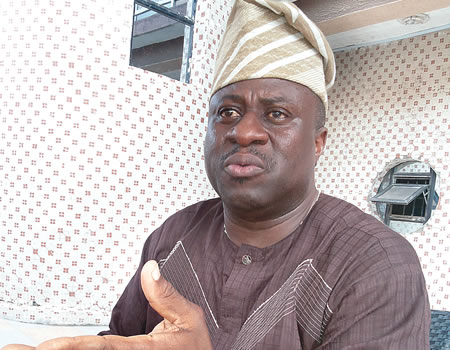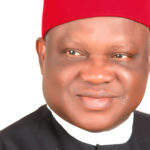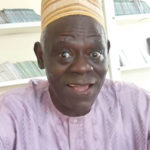| Nigeria is 57 today, but what seems to be the loudest chants is not a birthday song but the call for restructuring and perhaps the call for the renegotiation of the 57-year-old union. What do you make of this situation? |
We all realise how we attained independence and we know what the journey has been like to date; so today, we should ask ourselves why the agitations and the clamour are so high at this period. They have to do with the imbalance in the power structure; they have to do with what some sections of the country consider to be lopsided. Apart from these, we have to look at what we had in 1963 and juxtapose that with what obtained after the military incursion into government. The military moved Nigeria towards a unitary system; whereas, the nationalists who fought and won our independence had a dream of true federalism. With the incursion of the military, the structure is no longer reflecting the dictates of true federalism and that is why the agitations are so high.
But there is the impression that the clamour is sectional and that the advocates of restructuring are not clear on what it entails, as they have not been able to unite on the demands. As a former member of the House of Representatives, what is restructuring to you?
That cannot be correct; the agitations cut across and the demands are unambiguous. We have Northerners clamouring for restructuring; we have people from the South-West clamouring for restructuring and we have people from the South-East not only clamouring for restructuring but some of them even asking for Biafra Republic and they have all been united in asking for true federalism; fiscal federalism, resource control, devolution of powers and so on. These are all parts of the demands for true federalism. So, we need to ask ourselves why are people demanding for restructuring. And if you have seen some people asking for a return to regionalism; they have their points. At the heights of the regional governments, we know the height we attained under Chief Obafemi Awolowo in the Western Region. We know what we achieved with proceeds from cocoa. The South-West recorded many firsts; we had the Cocoa House, the first stadium, first television station, free education and so on. Where are we now?
When you talk of resource control, you will discover that the central government is acting like it is distributing free money; meanwhile the resources belong to the federating units. The centre is too powerful and today, Nigeria has many elected officials who are lazy and cannot think, but are contented with what they receive from Abuja on a monthly basis. So, we need to talk about fiscal federalism and to ensure that everybody has equal share of the national wealth. I think the time is right for us to sit down on how we can restructure Nigeria so that we can have true federalism and devolution of powers. The centre is too powerful. Yes, a school of thought has been advocating for a return to regionalism; but if we are not going back to regional government, we must ensure that the centre is not as powerful as it is now.
What is restructuring to you? Some advocates of restructuring refer to the waste of resources associated with the presidential system of government and bicameral legislature as avoidable, calling for a return to the parliamentary system.
To me, restructuring is about going back to the 1963 constitution.
What is it about?
It is about regional government; it is about a derivation formula that allows the regions to own a larger share of the wealth from the mineral resources in their domain, I think more than 50 per cent. In the 1963 constitution, which Nigerians gave themselves, it provided for a weak centre. A lot of things that are now in the Exclusive List were not there. The number one thing that is sacrosanct is that if Nigeria is to be restructured, it must go back to that constitution, which is a people-oriented constitution. After 1963, all other forms of constitution including the 1999 constitution were handed over by the military. In the 1963 constitution, you will recall with nostalgia that all regions were making successes; all regions had control of their resources and were actually paying part of the resources to the central government. It was a situation whereby the component parts were feeding the centre and not a system where the federating units go cap in hand to collect money from the Federal Government. So, irrespective of the kind of government we are operating, whether it is presidential or parliamentary; fairness, equal opportunities for all Nigerians irrespective of where they come from are important. It is also important that people have control of the resources domiciled in their regions. You saw what happened recently in the Nigerian National Petroleum Corporation (NNPC), where its board of directors was reconstituted and a region in the country did not have a representative and there were more representatives from the Northern part of the country whereas where the country gets crude oil was not well-represented on the board.
So, to my own mind; we need to get some loads off the Federal Government and make it weak by empowering the components parts more. There are two ways to look at this, even if we still retain the states, what are the things in the Exclusive and Concurrent Lists? A lot of things should be moved to the latter. For instance, what is the business of the Federal Government with primary education, primary health care? These are things that should be carried out by local governments, not even states. And if we are going back to the 1963 constitution, then we should back to regional government.
That is why it is unfortunate that report of the 2014 National Conference has been confined to the shelf. Irrespective of the party that organised it, I think the present government under President Muhammadu Buhari should have looked into that report. We had elder statesmen from the nooks and crannies of Nigeria sat down and they so many materials to work with including past constitutions and past reports from constituents assembly and these were used in coming up with the recommendations. The reports were so detailed. If this government had examined the report, even if it is for the enormous taxpayers’ money expended on the confab, I think it is reasonable.
Talking about marginalisation, we have over 300 ethnic groups in Nigeria, so that issue will always come up. You see, contestation for power leads to conflict in any society and in the cause of attaining power; everyone will try to whip up one sentiment or the other. But if we have genuine democracy, every section will have a say. In a democracy, they say the majority will have their way while the minority will have their say. With reference to the South-East, the Nigerian state has not done enough to reabsorb the Igbo back into the country since the civil war. There has been a mistrust in engaging the Igbo and if the president could say if you have not voted for me, then you should not expect much from me, I can say that is coming to pass and that may be igniting the fires of secession.
But could this mistrust be the only basis for calling for a renegotiation of Nigeria’s union?
It is more than that; there is a need to talk, to bring in a regime of equity, justice and fairness across board. For instance, as a former member of the House of Representatives, I know that Kano State have 40 members in the House while there are only 24 from Lagos and 14 from Oyo. Is that fair? When we had 12 states, Kano was divided into Kano and Jigawa, so old Kano State alone has about 78 House of Representatives members. Lagos State has remained the same ever since. Is that fair enough? Don’t you think something must be done to ensure that everyone gets equal treatment? I am an advocate of restructuring; it is only when restructuring fails that we can talk of renegotiating the unity of Nigeria. The call for restructuring is a call for dismembering Nigeria and breaking it into pieces, no. It is only when those who matter are not ready to listen, it is only when the legislators are not ready to consider the confab report and only when people fail to realise that it is better for us to have a weaker centre that we will have no other option than to call for a renegotiation of Nigeria’s unity. And on this note, I say that it is a welcome development that the Speaker of the House of Representatives, Rt Hon. Yakubu Dogara, has inaugurated an 11-man committee to look into the issue of restructuring.
If the calls for restructuring do not succeed, where do you see Nigeria in the next 10 years?
I see us treading a very dangerous path, because the agitations will become more and there will be a lot of restlessness. And as a student of peace and conflicts, I want to say that it is important for people to talk; we have a right to say how we want to be governed. It is unfortunate that referendum clause was not inserted into the constitution of Nigeria and there exists a window of opportunity, as the report of constitutional review committee is yet to be submitted; so if the House of Representatives decides to bring some things up as regards restructuring, then we will be moving in the right direction.
You were born October 1, meaning that you share the same date with Nigeria and must have had nostalgic feelings every time the country celebrates independence, is this the Nigeria of your dreams?
No. When I was growing up in Ibadan; I know the standard of living that we had as someone from a middle class family. We had Kingsway, which had one of the best meat pie that can compete with the ones produced in any western country. Back then, we had functional libraries. The University College Hospital (UCH) was an epitome of medical excellence that could compete with university teaching hospitals in the United Kingdom. Everything worked well but suddenly things began to go down. Military incursion didn’t help Nigeria. Even Ibadan then was way ahead in many areas; it was the intellectual capital of the South-West if not Nigeria. People would come from Lagos to Ibadan for night clubs and weekends. We were almost at par if not ahead of Lagos. For those who travelled abroad, the exchange rate was almost at par. So what has happened? We have not made progress, because the quality of life has gone down. The dreams of those who clamoured for independence have not been attained. And Chief Awolowo warned several times in the series of letters he wrote to those in power; he warned us of where we are today. We have independence but are we truly independent as a nation? What do import and export as a nation? The money from coal in Enugu, tin in Jos and cocoa in the South-West was used to prospect for oil, but once we got oil, we forgot about agriculture. In 2017, we are now talking about diversification; going back to those things we were known for 35, 40, 50 years ago. What is our position now in terms of cocoa producing nation? So, I don’t think this is the Nigeria that those who clamoured for the independence of this country wanted.
You May Also Like:
Restructuring: Sokoto, Kebbi, Zamfara support devolution of powers
Restructuring: Sokoto, Kebbi, Zamfara support devolution of powers






